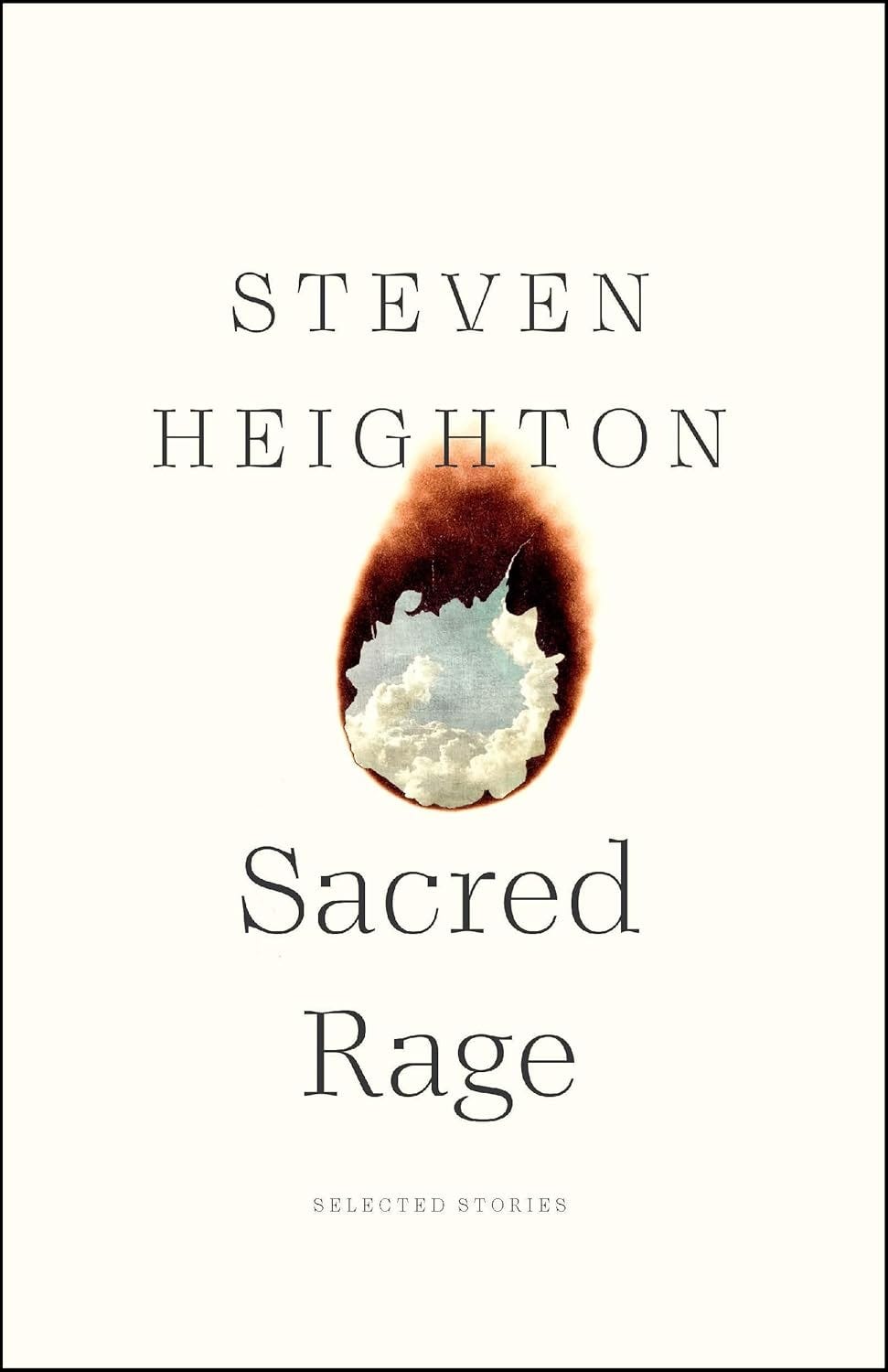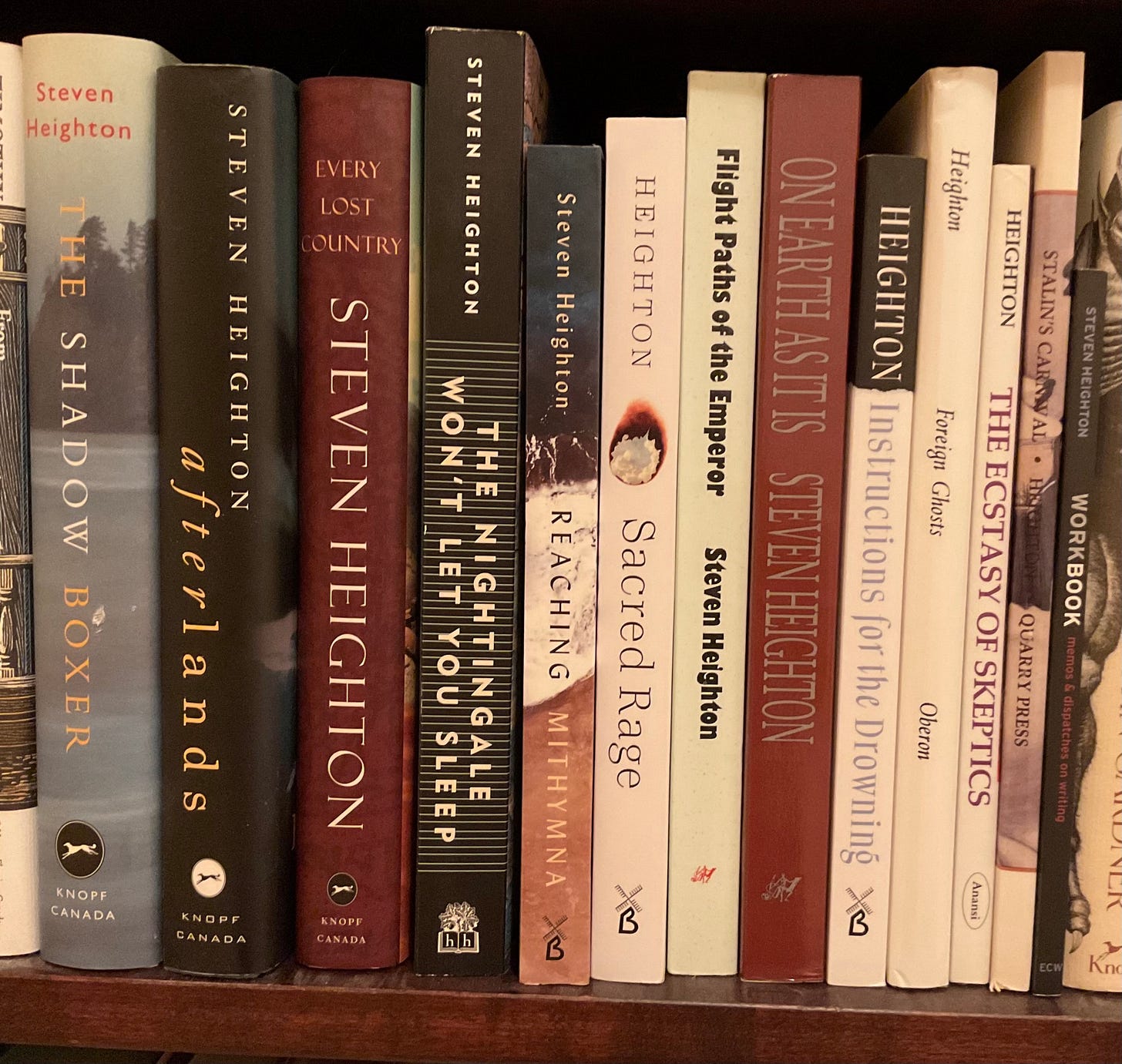Sacred Rage: Selected Stories by Steven Heighton
Reviewed by Ian Colford
The assertion that Steven Heighton is one of the very best writers this country has ever produced will not meet with much resistance. His intrepid nature and astonishing versatility, not to mention his dedication to craft, made him proficient at any form of written expression to which he set his mind. He was an effective and entertaining public speaker, a generous and self-effacing teacher. He was sensitive to the power of words and vigilant in his defence of the creative act. While many writers simply write to the best of their ability and never examine, question, or even discuss their gift, Heighton was curious, opinionated and forcefully articulate about what makes good writing good and bad writing bad. He was also a capable editor. And though to be edited by Steven Heighton was a dream come true, you were surely dreaming if you thought it was going to be easy. His death on April 19, 2022, at the age of 60, was everyone’s loss.
Now, three years later, Biblioasis has published Sacred Rage, a timely collection of Heighton’s short fiction, selected and introduced by his longtime editor John Metcalf, and taken from the four volumes published during his lifetime.
The collection opens with three Japan stories from Flight Paths of the Emperor (1992), a volume that fictionalizes Heighton’s experiences teaching English in that country. The reader immediately notices the exuberance of the prose, which drives each story’s relentless forward motion. These are fictions—observant, compassionate, probing, yet lightly humorous—about cultures, not so much clashing as failing to mesh. The young Canadian narrator, striving to learn anything and everything about this enigmatic country where he’s chosen to build a temporary life, time and again emerges into the light, blinking and scratching his head, none the wiser.
A world traveller himself, Steven Heighton could and often did set his fiction in far-flung locales (a wonderful example is his novel Every Lost Country, set the remote, mountainous terrain where Nepal borders Tibet), but much of his later short fiction is set in his native Ontario, in and around the Kingston area. In these stories, we often encounter people of limited means and modest prospects struggling to find a path forward. “Townsmen of a Stiller Town” comes to mind as a prime example of Heighton chronicling the exploits of a hapless protagonist to great comic effect but also reaching inward, to share with us the essence of what good fiction does best: entertain us while making us ponder what it means to be human and vulnerable. In this story, Tris Leduc has graduated from high school but, lacking both ambition and resources, finds himself delivering orders for his aunt’s “Pickin’ Chickin’” franchise while dressed in a chicken costume. The absurd outfit makes him a target of scornful amusement for some of the local louts, and Tris’s main objective throughout the story is to find reasons to not wear the costume—to, as it were, break free and become his own man—especially after a perplexing and troubling encounter while making a delivery to the local morgue.
Though Heighton’s narratives are principally mainstream in structure, he occasionally stretched himself stylistically. One such experiment is “Noughts & Crosses: An Unsent Reply,” an amusing dive into the mind of Nella, who’s received an email from her lover breaking off their relationship. Through the course of her lengthy “unsent reply,” Nella analyses her former lover’s message phrase by phrase, line by line, parsing out hidden meanings and facile justifications in her search for a truth that will assuage her broken heart and wounded pride.
In this collection of standout works, two stories deserve special mention. “Shared Room on Union” takes place on a city street. It’s past midnight and Justin and Janna, together in Justin’s Volvo, are ending their date with a moment of intimacy when a man taps on the driver’s side window. He has a gun and is intent on jacking the car. The incident proceeds, intense and fraught as one would expect, but not without several twists that display Heighton’s flare for uncovering human comedy in unexpected places. And in “The Dead Are More Visible,” middle-aged Ellen, who during the winter works nights flooding and maintaining the city park’s skating rinks, finds herself the focus of threatening behaviour from three drunken youths. Lashing out to protect herself, she causes one of the men a gruesome injury and instantly becomes the young man’s saviour as his two friends abandon him. Both stories find concise, sometimes funny, sometimes bitter, dramatic ironies in the human condition and universalize the conundrums facing their characters, to whom we are drawn in sympathy like a thirsty horse to water.
In his introduction, John Metcalf says,
Steve fought through to the ability to make writing that overwhelms us, enraptures us, that makes us see again our world as we saw it once in childhood, the world that, in [John] Cheever’s words, lies spread out around us like a bewildering and stupendous dream.
Steven Heighton sought to recreate that dream with every word he committed to paper. He was a writer of surpassing integrity, unabashedly self-critical, who never stopped setting lofty goals for himself. He was an enemy of mediocrity who could be offended by a misplaced modifier. For him, writing was nothing short of a matter of life and death. He was always striving to make his own work better and wanted the same from others. And yet he knew and freely acknowledged that perfection is impossible (In Work Book, his collection of aphorisms and advice for writers, he wrote: “Cast a spell and the small flaws don’t matter.”). In his lifetime he achieved more success than most of his colleagues, but was familiar with the ritual humiliations that accompany the writing profession. He was an exceptional mentor and friend.
Sacred Rage is a fitting tribute to Steven Heighton’s legacy. The stories collected here demonstrate his remarkable range and achieve a standard that writers everywhere should aim for.
About the Author
Steven Heighton (1961–2022) was a writer and musician. His twenty previous books include the novels Afterlands, a New York Times Book Review Editor’s Choice, and the bestselling The Shadow Boxer; the Writers’ Trust Hilary Weston Prize finalist memoir Reaching Mithymna: Among the Volunteers and Refugees on Lesvos; and The Waking Comes Late, winner of the Governor General’s Award for Poetry.
About the Reviewer
Ian Colford was born, raised, and educated in Halifax. His reviews and stories have appeared in many print and online publications. He is the author of two collections of short fiction and two novels, and is the recipient of the Margaret and John Savage First Book Award for Evidence.
Book Details
Publisher : Biblioasis
Publication date : Aug. 19 2025
Language : English
Print length : 288 pages
ISBN-10 : 1771966491
ISBN-13 : 978-1771966498





